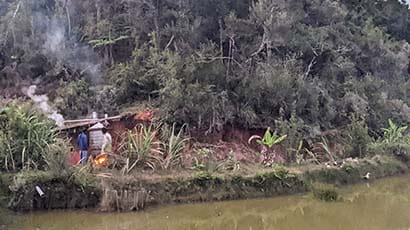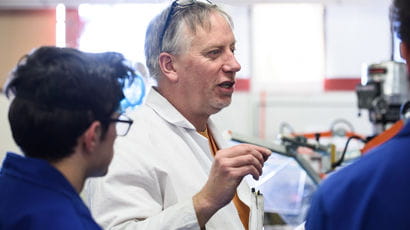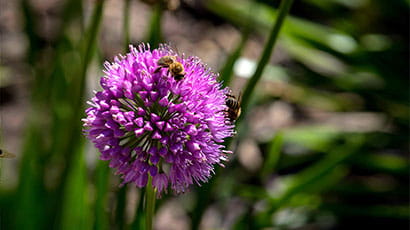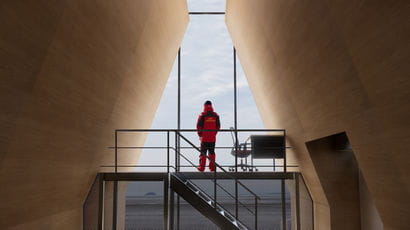Can DIY greening solutions transform your street and combat climate change?

Do-it-yourself (DIY) greening kits could help safeguard the country's most vulnerable communities from the impacts of a rapidly changing environment, according to a new project supported by UWE Bristol.
The project, DIY Greening Prescription for Climate Adaptation in Urban Streets (GP4Streets), is backed by £2 million from the Natural Environment Research Council. GP4Streets will provide tailored “greening prescriptions” for UK streets, offering communities practical solutions to adapt to local climate challenges.
At first, the GP4Streets project will equip neighbourhoods with monitoring tools to measure key environmental factors such as air quality, temperature, and water flow. Then, the community will be provided with DIY greening kits to implement in their environment. Over the project duration, sensors will track the benefits of greening efforts, such as planting trees and installing green walls, to help fine-tune climate adaptation strategies for UK streets.
Led by the University of Surrey, the project brings together experts from UWE Bristol and three other institutions - the University of Bath, the University of Sheffield, and Imperial College London. Nine local councils, charities, and industry partners are also on board to support the rollout and scaling up of these green solutions across UK towns and cities.
By partnering with councils, charities, and local groups in the South West and South East, GP4Streets will directly engage citizens, creating community leaders to champion these efforts. Workshops and user-friendly guidelines will support lasting change, helping more communities embrace climate-resilient solutions.
For UWE Bristol’s contribution to the project, Dr Issy Bray, Associate Professor in Public Health (Epidemiology), will lead research on the social, health and wellbeing impacts of street-level interventions, and co-lead the development of case studies in the West of England, and data collection from local communities. Danielle Sinnett, Professor in Sustainable Built Environments, will lead mapping of GBGI (Green Blue and Grey Infrastructure) in the West of England and DIY greening guides development, while co-leading investigation of street-level interventions' socio-economic impact, and the development of case studies and a decision-making tool for DIY solutions.
Dr Bray said: “We are delighted to be involved in this exciting project which builds on existing research at UWE Bristol and the University of Surrey. This approach to mitigating climate change will test a range of interventions targeted at households and streets, harnessing the power of change at the community level. UWE Bristol will play a strong role in ensuring that mental wellbeing is integral to assessment of climate change mitigation strategies, and that interventions are co-developed with local communities.”
Sarah Jackson, Green Infrastructure and Climate Resilience Manager at Bath and North East Somerset Council, said: “The GP4Streets project will support Bath and North East Somerset Council's priorities to tackle the climate and ecological emergencies and improve health in our communities. We have a strategy to green our neighbourhoods, and this research will help us to optimise green infrastructure interventions for individual streets and identify where investment will have most impact.”
The University of Surrey’s Professor Prashant Kumar, principal investigator of the project, said: “Our country's most vulnerable need a step-change in how we adapt to volatile weather and transform built environments, like streets, where limited space restricts the scope for interventions. Working hand-in-hand with communities, charities, businesses, and local councils, we'll create tailored DIY greening solutions as a "prescription" for urban streets – from green walls to front and back gardens. With state-of-the-art monitoring, communities will see improvements in air quality, temperature, and biodiversity firsthand.”
Related news

15 December 2025
UWE Bristol rises eleven places in People & Planet University League
UWE Bristol has risen to 14th in the People & Planet University League (UK), a jump of eleven places.

12 December 2025
UWE Bristol’s environmentally conscious and student-focused accommodation wins three awards
Purdown View, the world's largest certified Passivhaus student accommodation development, has been recognised at Property Week Student Accommodation Awards.

25 November 2025
UWE Bristol experts join film Q&A exploring music and melodrama
Academics will take part in the Cary Comes Home Festival, with a post-screening Q&A exploring music, melodrama and emotional storytelling in classic cinema.

24 November 2025
Graduate’s winning design to feature on Brabazon Hangar
UWE Bristol and YTL Developments have teamed up to run a student design competition for a large-scale artwork at the Spitfire Community Hangar at Brabazon.

20 November 2025
UWE Bristol ranked among top 12 per cent of universities globally for sustainability
UWE Bristol has climbed over 400 places in the QS World University Sustainability Rankings 2026, which evaluates universities on a range of environmental and social impacts.

14 November 2025
Lecturer wins prestigious Times Higher Education award for innovation in teaching
A senior paramedic science lecturer at UWE Bristol has been named the most innovative teacher of the year in the Times Higher Education Awards 2025.

06 November 2025
UWE Bristol welcomes West of England Mayor for annual Green Week
Helen Godwin, Mayor of the West of England, visited UWE Bristol during its annual Green Week to see the sustainability-driven research, innovation and skills initiatives that are helping to power the growth of the region’s green economy.

15 October 2025
UK food needs radical transformation on scale not seen since Second World War, new report finds
A new report from the Agri-Food for Net Zero Network+ finds urgent action on food is needed if the UK is to reboot its flagging economy, save the NHS billions, ensure national food security, and meet climate commitments.

08 October 2025
Illustration graduate wins global award
Illustrator and designer Rosalyn Burroughs, who graduated from UWE Bristol in 2024, has won a World Illustration Award for a bus wrap design.

29 September 2025
Smartphone use hitting struggling pupils hardest, major study finds
Young people struggling with their studies at school are much more likely to have negative experiences on their smartphones than their better performing peers, a major new study has found.

24 September 2025
UWE Bristol to help protect threatened forest in Madagascar in £800k project
UWE Bristol is a partner in a groundbreaking project awarded almost £800,000 in funding to protect one of Madagascar’s most precious and threatened forests.

19 September 2025
Invest to unlock economic growth in the West of England: The Brunel Centre research gives new insights into region’s economy
The first report from the university-business partnership The Brunel Centre reveals investment in the West of England could energise efforts to grow the UK economy.
You may also be interested in

Media enquiries
Enquiries related to news releases and press and contacts for the media team.

Find an expert
Media contacts are invited to check out the vast range of subjects where UWE Bristol can offer up expert commentary.

Sustainability at UWE Bristol
Sustainability is embedded in our culture, research and teaching. We have already invested heavily in campus improvements and new technology, with plans underway to be carbon neutral by 2030.

School of Architecture and Environment
A broad-based intellectual community committed to an inter-disciplinary approach to the creation and management of sustainable buildings, whether they are in urban or rural environments, residential or commercial, new or refurbished.






